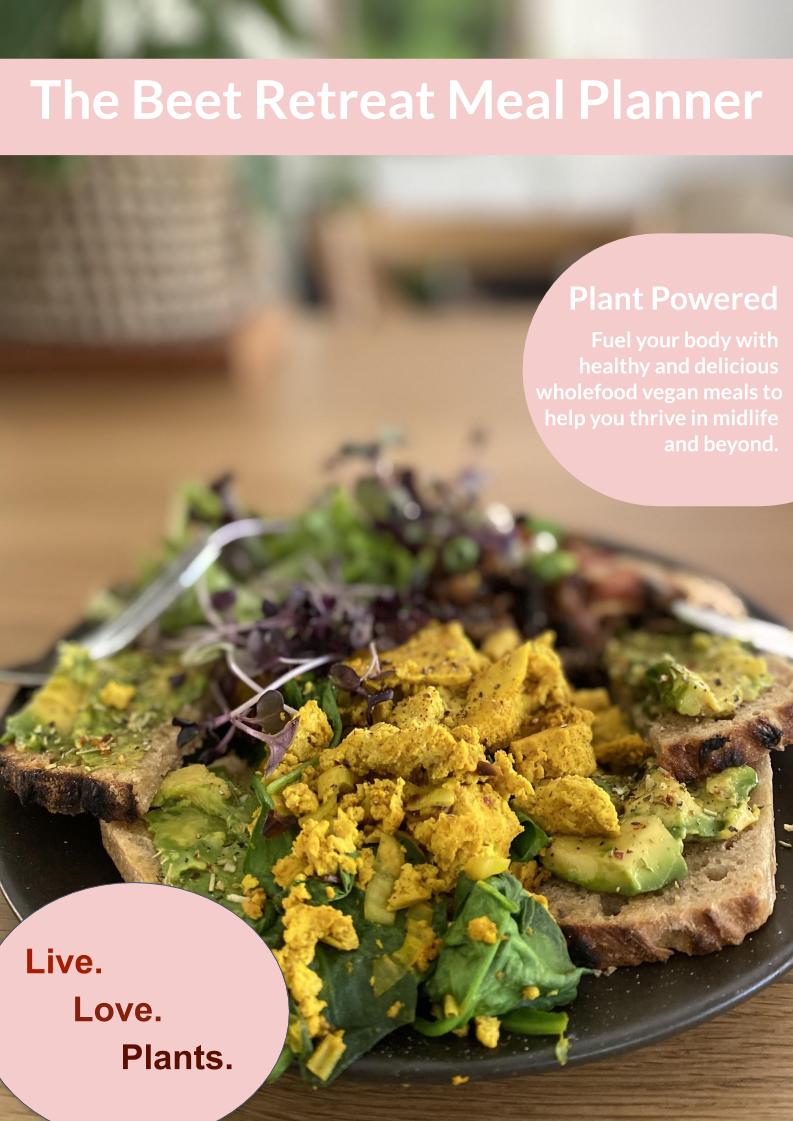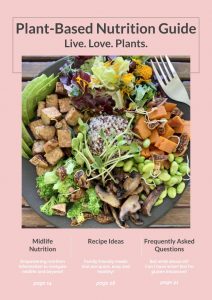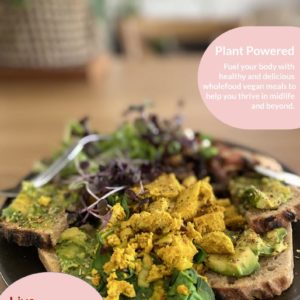Description
Whole food Vegan recipes – 120 pages and 80 vibrant whole food recipes for the whole family to love and thrive on!
While I created this Vegan Meal Plan with other midlife women in mind, these recipes and the nutrition info contained, are relevant to all.
Ladies, and indeed Gents, bone density is a thing! A thing we need to be proactive about…from a young age!
How we eat and live before we reach 30 will play a very large role in determing how dense our bones are. Kinda like money in the bank. As we age, and particularly after 50 or menopause we start making a lot more withdrawals and will find it much more difficult to stay in the black if we arent conscious and vigilant.
This isnt meant to scare you but I do hope it motivates you!
Reaching our 40’s and 50’s is a time when how we’ve lived our previous years, the good, the bad and the ugly, begins to catch up. When we discover that some of the things that we could once do (or get away with!) we no longer can.
For women, we may experience peri-menopause or indeed menopause itself, as early as our late 30’s or early 40’s. Whatever the age, the cessation of menopause is a timely reminder to become more engaged with our health beyond the superficial. This may be the first time in our lives we’ve ever really contemplated the quality of our bone or perhaps, even our health in general.
We Have the (Plant) Power:
There are elements within our diet and lifestyle that we, men and women alike, need to pay attention to in order to preserve, or indeed create, a healthy, thriving body. It’s a somewhat inconvenient truth for many of us. We need to be more proactive in co-creating robust health that can dynamically sustain us well into our 90’s. Fracture, heart disease, obesity, cognitive decline, diabetes, loss of muscle tissue and many cancers and inflammatory diseases need not be part of our ageing process. We have so much more control regarding the ongoing quality of our lives than we think. Simply through our day to day practices. Making better choices. Simple but truly profound choices.
Acid Producing Foods:
But plant based? Meat builds muscle and dairy products make our bones strong right? This theory has held sway for decades. But it has now become clear that, although indeed high in calcium (dairy) and protein (both), dairy and all animal products are also acid forming foods. Our over consumption of them are coming at great cost to both our health and that of the planet.
Granted, a recent and extensive Harvard study has concluded that vegans suffer a higher fracture rate than vegetarians and meat eaters. Despite what we vegans would like to believe, a vegan diet is not infallible. The devil is as usual, in the detail.
But equally, the risk of fracture aside, the more often we choose animal based recipes and meals over whole food vegan recipes and meals, the more devastation it brings. The same applies to any kind of highly refined and processed foods also. Plant based or animal derived.
Animal Protein and Kidney Function:
As an oft overlooked example… let us look at kidney function. A serious health issue that even fewer of us consider in relation to our ongoing health.
Here’s a summary from Dr Michael Greger of www.nutritionfacts.org
“Our kidney function tends to decline progressively after our 30’s, and by our 80’s, our kidney capacity may be down to half.
Protein derived from plant foods accompanied by antioxidants that can fight free radicals. Plant protein is also less acid forming as it tends to have less sulfur–containing amino acids. One of the reasons plant foods tend to be less acid-forming than animal foods is because acid is produced by the sulfur in the protein, and there’s less in plant proteins.
So, the more important determinant of the effect of dietary protein on kidney disease progression is the quality of the ingested protein. In other words, whether it induces acid production like most animal protein, or base production (alkaline) like most fruit and vegetables. Not so much the quantity of protein ingested.”
Yes, as we age we should choose (and increase) our whole food calcium and also to a reasonable degree, protein, even more carefully. What source, animal or plant, we consume those nutrients from matters. And matters very much, especially if we are also at risk from pre-existing health issues as many in mid life are. Protein and Calcium yes. But make those sources mostly alkalising plant sources, if not exclusively then predominantly.
If you are already plant based, the rise of processed and convenience foods has probably been a delight. But that delight comes at an ever increasing cost. As vegans move away from inherently healthy, whole food vegan recipes we cook at home to what is basically a junk food vegan diet, similar health issues that come as a result of a diet high in animal products (and processed foods) can begin to surface. High fat, salt, sugar and refined foods in general undermine our health and vitality. Both today and increasingly so through our later years.
Plant Based Knowledge is Power.
This bundle includes both The Beet Retreat Nutrition Guide (44 pages) and the Meal Planner (76 pages). The bundle contains 85 whole food plant based recipes with no refined sugars, minimal salt and very little oil (oil is listed as an option only in a handful of recipes)
Included in the Nutrition Guide are several pages specifically addressing health issues that those of us in our middle years are more likely to experience or should be mindful of. These Nutrition Know How pages have been contributed by Emma Strutt, a highly respected Dietician and Nutritionist based in Queensland, Australia. Emma is also the dietician I sought out after my own diagnosis with osteoporosis mid 2020. greenstuffnutrition.com
Menopause and Osteoporosis
My diagnosis came as a big surprise to me and to those who know me, including health professionals. I’d always led an active life. In 2012, peri-menopausal at 50, I went vegan. I was, thankfully, eating a mostly healthy, whole food diet. But I was also a light framed caucasian woman and doing little targeted weight bearing exercise due to a recovering back and shoulder injuries. Diet aside, it was a perfect storm.
I SHOULD have returned to more specific weight bearing exercise as soon as I could. And been more mindful of my intake of calcium rich plant foods like calcium fortified soy milk and tofu, asian greens and kale and white beans. I had very few of these foods. Thankfully I had given up acid forming animal products but I could have done so much better in those critical first 8 years of menopause.
I had suffered a back injury at work in 2011. Recovering 18 months later, the last thing I wanted was to be stuck inside pumping weights. I “knew” I should but I did not empower myself with enough knowledge. Instead I began ultra running, starting from ever increasing walking distances. As I recovered, the pull of wide, wild places was stronger than a then hypothetical bone density issue.
I have learnt that long distance running CAN break down not only muscle tissue, but bone also. Shorter distance running or jogging however, is beneficial.
Bone Breakdown and Remodelling:
The breakdown and remodelling of bone in itself is normal and necessary in everyone. The Bone tissue is continually remodelled through the highly effective cycle of resorption and formation. Cells called osteoclasts perform the task of removing aged or useless bone. Osteoblasts are responsible for the formation of new bone. This is how our skeletal system, our bones, stay strong and dense.
When the interplay between the two is impaired however, problems arise. At menopause, the drop of oestrogen leads to more bone resorption than formation. At this age we may also become less active. Spend less time outside in natural sunlight (Vitamin D deficiency). We may also drink more alcohol and smoke. And very likely eat less whole plant foods. All these factors contribute to the risk of developing osteoporosis and other lifestyle related health problems.
There is so much in our control and it is never too late to implement positive change. In fact it is even more of an imperative as we age!
Enjoy these family friendly recipes! May they be just the start of the tool kit you are building for a life of discovery and empowerment.
Hot Tips Beyond this Guide:
If you are menopausal or have fractured from simple falls previously, do get a (DEXA) bone density test. You will need a referral from your GP. If there are no pre- existing health issues you will likely be out of pocket. I did. But it was so worth it!
Do seek the guidance of a dietician experienced in plant based nutrition. I would urge you to look at the website www.veganaustralia.
If you are international, contact a regional vegan group for assistance in finding qualified health professionals.
More Life in our Years and Years in our Life:
In closing, I hope you discover many favourite recipes and lots of useful and empowering information in these pages. The premature breakdown of our bodies is not a normal part of ageing.
I once heard an esteemed plant based doctor say “We aren’t living longer, we are dying longer”. While ageing and death is inevitable, let it not be prematurely from a condition or disease preventable with lifestyle interventions.
Life has so much more to offer us as older people. Our latter years should and CAN be some of the happiest, most experience packed of our many decades!
May these guides be the start of something wonderful for you and yours.
yours in a plant strong life,
Jan Saunders aka “Marvellously Midlife”



